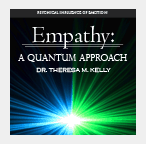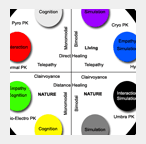Psychical Phenomena
Parapsychology Parapsychology Articles, Papers and Books
Home > Articles > Psychic Phenomena Q&A
![]()
|
| NEWSLETTERS |
| Get the best from QPsychics.com in your inbox! |
|
| PARAPSYCHOLOGY ORGANIZATIONS |
"With confidence in the importance of utilizing the investigative mode of the established sciences in order to inquire into the authenticity and to potentially explain the nature of psychical phenomena."  |
 |
 |
 |
 |
Can you Briefly Explain the Mechanisms of Psi, How Psi Works?
The following is a summary of my hypothesis of the mechanisms involved in psi processes. When an individual finds themselves in an urgent need (psi is theorized to be a evolutionary survival mechanism by most parapsychologists), I assume the psychophysiological stress caused by the ‘need’ results in oxidative stress in various areas of the body. I assume this results in the increase of the amplitude of the ultra-weak biophotonic field around the individual (scientifically proven to exist) due to electrons in the body being lowered to the ground state where by emitting biophotons. At this time, I assume the biophotons then detect diverse information in regards to the individual, the situation, and the environment via the quantum teleportation of information (communication of information at a distance between photons; a scientific possibility). I then assume the biophoton energy is then converted into electrical energy (scientifically possible) and the information is then processed by the central nervous system, and sent through the memory areas of the brain (a parapsychological theory with a very solid basis) and shortly thereafter the information is consciously cognized by the individual. This particular model assumes the process of receiving psi-based information through Clairvoyance. The same model can be used to describe ESP reception and transmission, and PK (e.g. 'environment, biophotonic field, CNS, memory, conscious awareness' or reverse 'conscious/subconscious intent, memory, CNS, biophotonic field, environment.')
(Adapted from the book “A Quantum Approach Series” by Theresa M. Kelly, MsD.)
|
|||
Related Articles |
|||

